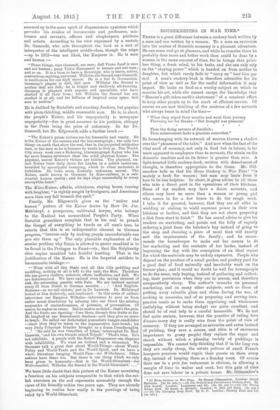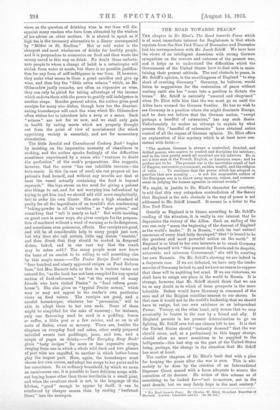HOUSEKEEPING IN WAR TIME.* THERE is a great difference between
a cookery-book written by a man and one written by a woman. To a man an excursion into the realms of domestic economy is a pleasant adventure. He can come and go at pleasure, and while he remains there he probably does more and better work than could be done by a woman in the same amount of time, for he brings that price- less thing, a fresh mind, to his tasks, and she can only rely on the "staying power" which is handed on from mother to daughter, but which rarely fails to " carry on" taut bleu que mai. A man's cookery-book is therefore attractive for its point of view as well as for the useful information it may impart. He looks on food as a worthy subject on which to exercise his art, while she cannot escape the knowledge that "Heaven's gift takes earth's abatement" of a constant effort to keep other people up to the mark of efficient service. Of course we are now thinking of the mistress of a few servants who always bears in mind the time- " When they wiped their mouths and went their journey Throwing her for thanks= But drought was pleasant.'
• • Thus the doing savours of disrelish ; Thus achievement lacks a gracious somewhat."
So housekeeping with its network of worries throws a shadow over the" pleasures of the table." And now when the fact of the vital need of economy, not only in food but in labour, is far more apparent to employers than to servants, the strain on the domestic machine and on its driver is greater than ever. A light-hearted little cookery-book, written with detachment of thought, is therefore appropriate to the times. Mr. Old. meadow tolls us that his Home Cookery in, War Time' "is mainly a book for women ; but men may learn from it how to be lose helpless. In short, it gives advice to all those who take a direct part in the operations of their kitchens. Some of my readers may have a dozen servants, and others may have no more than a woman or young girl who comes in for a few hours to do the rough work. I take it for granted, however, that they are all alike in wielding or wishing to wield supreme power in their own kitchens or larders, and that they are not above preparing a dish from start to finish." He has sound advice to give his readers on marketing, and points out the folly of vaguely ordering a joint from the butcher's boy instead of going to the shop and choosing a piece of meat that will exactly suit the requirements of the family ; and he recom- mends the housekeeper to make out her menus to fit her marketing and the contents of her larder, instead of beginning the day with the conception of an ideal repast for which the materials may be unduly expensive. People who depend on the produce of a small garden and poultry yard for a good deal of food naturally and inevitably work on the former plan; and it would no doubt be well for townspeople to do the same, only buying, instead of gathering and collect- ing, their provisions when they are in season, and therefore comparatively cheap. The author's remarks on personal marketing, and on many other subjects, such as those of putting away valuable glass and china during the war, of cooking in casseroles, and of so preparing and serving inex- pensive meals as to make them appetizing and wholesome (satisfying without being stodgy) are quite excellent, and should be of real help to a careful housewife. We do not feel quite certain, however, that the practice of eating hors d'ceuvre every day is really wise from the point of view of economy. If they are arranged as savouries and eaten instead of pudding, they save a course, and (this is of enormous importancè to gouty people) they replace the sugar and starch without which a pleasing variety of puddings is impossible. We cannot help thinking that if in the long run they are really cheap, the astute patrons of small French bourgeois pensions would regale their guests on them every day, instead of keeping them as a Sunday treat. Of course their use in a prix fize restaurant is obvious, in allowing a margin of time to waiter and cook, but this gain of time does not save labour in a private house. Mr. Oldmeadow's • (1) lioms Cootery in War Time. By Ernest Oldmeruloro. London: Grant Richards. [2s. Bd. net.]—(2) The Invalid and Convalcsceot Cookevy Book. By Alys Lowth. London: Loincntans and Co. [le. Gd. net.1—(3) The Bente. Recipe Book. . By Annie A. Barnett. London: G. Bell and Sons. [25. net.] —(4) The Bvervaay Soup Book. By G. P. London: Stanley Paul and Co. Ps not] views on the question of drinking wine in war lime will dis- appoint many readers who have been attracted by the wisdom, of his advice on other matters. It is absurd to .speak as if , high tea is the necessary alternative to a dinner accompanied ' by " Medoo or St. Mullion." Hot or cold water is the. :cheapest and most wholesome of drinks for healthy people, and it is purposeless, to economize on food and then waste the money saved in this way On drink. No doubt those unfortu- nate people to whom a change of habit is a catastrophe will shrink from water at meals, but there is no possible justifica- tion for any form of seltindtagence in war time. If, however, they make what seems to them a great sacrifice and give up wine, and then buy the "little extra solaces" which, as Mr.
Oldraeadow justly remarks, are often as expensive as wine, they can only be pitied for taking advantage of the income which endows them with the power to gratify self-indulgence in another shape. Besides general advice, the author gives good receipts for many nice dishes, though here too the discrimi- nating housekeeper will omit the wine which Mr. Oldmeadow often wishes her to introduce into a soup or a sauce. Such " solaces " are not for us now, and we shall only gain in health by eating meals which are , properly thought out from the point of view of nourishment (for which appetizing variety is essential), and not for momentary stimulation: The little Invalid and Convalescent Cookery Book2 begins by insisting on the imperative necessity of cleanliness in cooking, and the author speaks feelingly of the difficulties sometimes experienced by a nurse who "ventures to doubt the perfection" of the cook's preparations. She suggests, however, that the nurse "has one infallible recourse—the bain-marie. In this (in case of need) she can prepare all her patient's food herself, and without any trouble see that at least the vessel actually containing the food is beyond reproach." She lays stress on the need for giving a patient nice things to eat, and for not worrying him beforehand by trying to get him (and we should add still more emphatically, her) to order his own dinner. She sets a high standard of purity for all the ingredients of an invalid's diet, condemning "baking-powder in all its varieties" as "slow poison," and remarking that "salt is nearly as bad." But while insisting on great care in some ways, she gives receipts for the prepara- tion of mackerel without a word of warning as to its dangerous, and sometimes even poisonous, effects. Her receipts are good, and will be of considerable help to many 'people just now, hut why does she call certain little egg dishes "omelets," and then direct that they should be cooked in fireproof dishes, baked, and in one case say that the result may be eaten cold ? Too many people must now know the taste of an omelet to be willing to call something else by this magic name.—The Penlee Recipe Boole3 contains "four hundred and ninety approved recipes on Food Reform lines," but Mrs. Barnett tells us that in it various tastes are catered for, "as the book has not been compiled for any special section of food-reformers," but "at the request of many friends who have visited Penlee" (a "food reform guest- house"). She also gives us "typical Penlee menus," which may or may not appeal to the reader's own particular views on food values. The receipts are good, and a careful housekeeper, whatever her "persuasion," will be able to adapt them to her own ends. Some of them might be simplified for the sake of economy ; for instance, only one flavouring need be used in a pudding, lemon or coffee, a little peel or a few raisins, and so on in all sorts of dishes, sweet or savoury. There are, besides the chapters on everyday food and cakes, other easily prepared unboiled sweets (not puddings), jams, and ices, and a couple of pages on drinks.—The Everyday Soup Book4 gives "tasty recipes" for more or less expensive soups, ranging from one in which a whole wild duck and two glasses of port wine are engulfed, to another in which butter-beans play the largest part. Here, again, the housekeeper must choose her own course, and adapt her soups to her purse and to her conscience. In an ordinary household, by which we mean an omnivorous one, it is possible to have delicious soups with- out buying bones other than those inevitable in a small joint, and when the resultant stock is not, in the language of the kitchen, " good " enough to appear by itself, it can be reinforced by cheaper means than by casting "beefsteak (lean) " into the saucepan. "



































 Previous page
Previous page